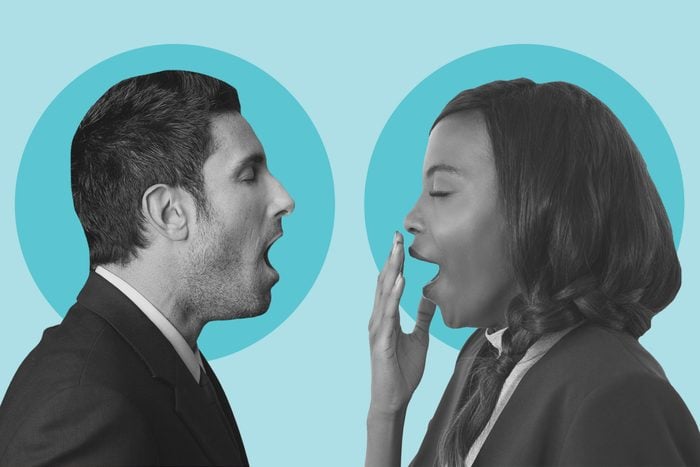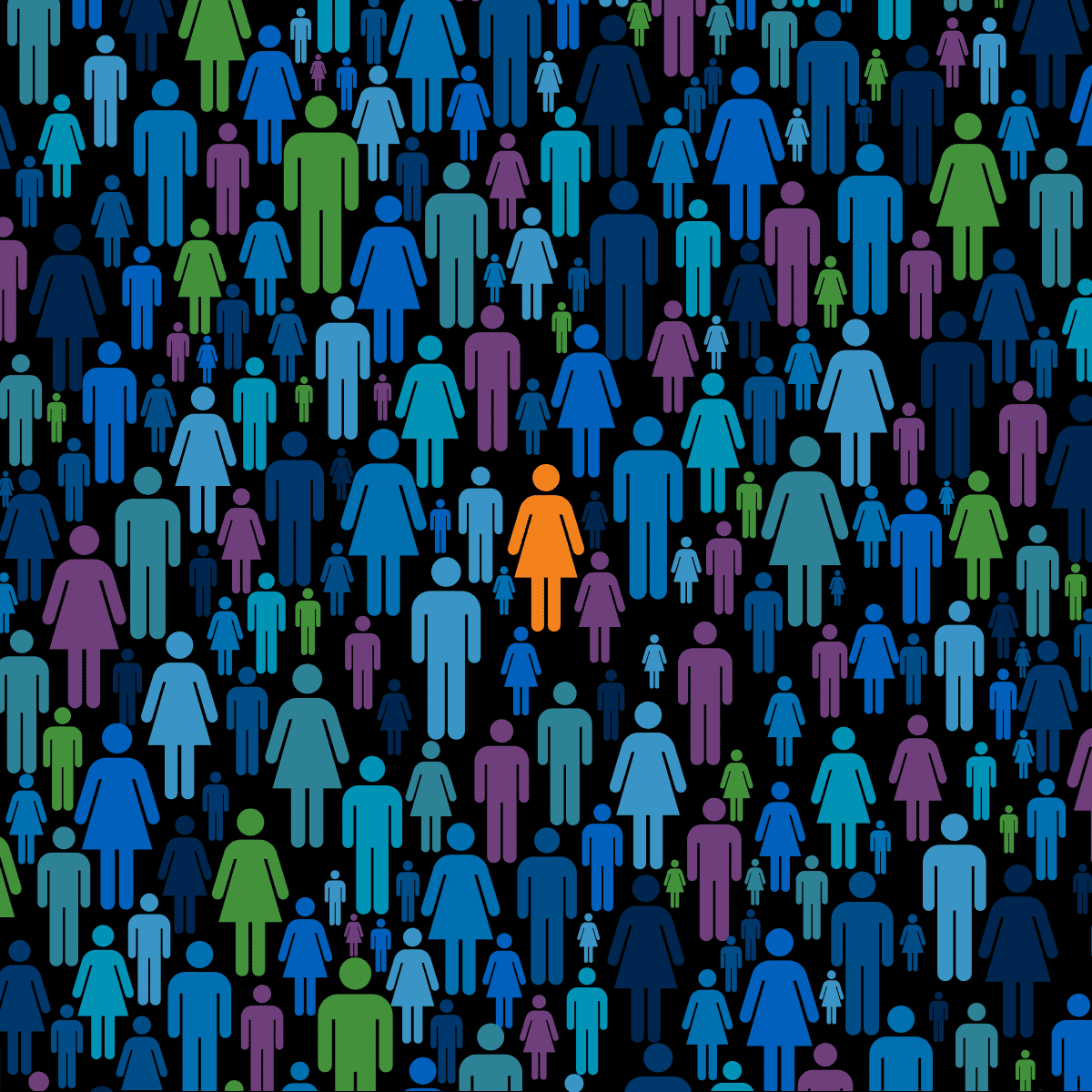Why Are Yawns Contagious? Experts Weigh In on the Science Behind Yawns
Updated: Jan. 11, 2024

Are you prone to catching yawns? Turns out there are some scientific reasons why yawns are so contagious. Here's what the experts say.
Similar to sneezing or hiccuping, yawning is a spontaneous reflex that you can’t really control. You may try to stifle a yawn, but it’s something that happens without thinking about it. Unlike sneezes or hiccups though, yawns seem to be infectious. Have you ever seen someone yawn and found yourself doing it too? It’s not your imagination. But why are yawns contagious?
Yawning is not an inherited trait or an emotional expression (like why we laugh). But is it just another mystery of the human body? While not entirely understood (similar to earworms), there are science-backed reasons behind the infectiousness of yawns. We asked experts who have spent years studying the complex reflex why they tend to be contagious—and whether we’re actually sleepy when it happens. Here’s what they had to say.
Get Reader’s Digest’s Read Up newsletter for more trivia, humor, cleaning, travel, tech and fun facts all week long.
Why do we yawn?
“A yawn is a form of reflex action, which involves a deep [inhalation] of air, alongside a wide opening of the jaw, shortly followed by a rapid exhalation of the [inhaled] air,” says Beverley Brown, PhD, who investigated the neural and social correlates of automatic behaviors during her PhD at the University of Nottingham. The short version: She’s studied yawns. It’s a perplexing human function (unlike the rarest eye color or the rarest hair color, which can be attributed to genetics). But there are several reasons why we yawn—and it’s not just because we’re sleepy.
Yawning is tied to our circadian rhythm
Yawning follows a circadian pattern, says evolutionary biologist Andrew Gallup, PhD, a professor of biopsychology at State University of New York Polytechnic Institute, who has also studied yawning. People are most likely to yawn in the morning shortly after waking up or at bedtime at the end of the day.
Yawning could also represent a behavioral sign of being ready to wake up or go to sleep, says one study published in the journal Physiology & Biology. So if you’re yawning a lot in the evening, take it as a sign from your body that it’s time to hit the hay early. But if you’re yawning in the morning, it could be a sign that your body is doing its part to increase alertness.
Yawning helps us become more alert
Yawning is the body’s way of keeping us alert, and Gallup says this is likely connected to body temperature. “Body [and brain] temperatures are at the lowest point when we’re asleep, and there is a pretty stark increase in body temperature when we wake up,” he says. By yawning after waking up, you help cool the brain down, which helps you become more alert and ready to conquer the day.
While the temperature of the brain and body remains fairly consistent, there are small, constant fluctuations that occur. The body has a few ways to bring temperatures back to base level. For example, when we go outside in the cold, the body starts to shiver as a way to warm up, says Gallup. Similarly, yawning helps cool the brain when the temperature rises above the baseline.
So why is having a cool brain helpful? Being warm is associated with feeling tired, says Gallup. Yawning cools the brain, causing more alertness. Because of this, it’s believed that yawning is an evolutionary reflex that has helped keep humans safe.
Because we see someone else yawn
It’s true that yawning is contagious. A yawn could be triggered by seeing, hearing or even thinking about yawning. Gallup notes that some people are more prone to catching a yawn than others. In one study, 50% of participants yawned in response to watching a video of someone yawning, while the other 50% did not.
Why are yawns contagious for some people more than others? The researchers theorize that people who are more susceptible to contagious yawning have a higher level of social-cognitive processing (which is the way people process and apply information about others). Contagious yawning has also been linked to empathy, and another study found that psychopaths are often immune—that is, less likely to yawn if they see someone else do it.
So, why are yawns contagious?
One of the most curious things about yawning is just how contagious it can be. But why are yawns contagious? There is little understanding, but one theory is because of mirror neurons, which are neurons that match our actions with the actions of others, says Brown. “This suggests that there is a social communication element to contagious yawning. This research, and that of others, goes some way into explaining why you can feel compelled to yawn when observing other people yawn,” she says.
Gallup adds that many of our behaviors are influenced by what others around us are doing—even reflexes like yawning. For example, people are much more likely to laugh in the presence of others than when they are alone, according to one study published in Trends in Cognitive Sciences. “Like laughing, yawning is something that happens spontaneously and can also be influenced socially,” Gallup says. This too may have evolutionary roots, he explains. One theory is that contagious yawning originally helped groups be more vigilant, ready to ward off danger.
Does yawning mean you’re tired?
Even though studies have shown that we yawn when we are fatigued (and when we’re awakening), it’s not a sign of sleepiness, but rather a reflex tied to body temperature to keep you awake. You may take that as a sign to head to bed. But both Brown and Gallup say that it’s a big misconception that someone only yawns because they’re tired or bored.
“People get upset if you yawn [around them], but yawning is a reflex similar to sneezing or hiccuping,” Gallup says. “In fact, if someone yawns, it could be indicative of an attempt to try to pay attention or maintain focus.”
Do animals yawn?
Just like humans, animals yawn too. In fact, dogs yawn often, and for exactly the same reason that humans yawn: It’s a reflex that cools down the brain. Gallup says that animals are also susceptible to contagious yawns, and humans can even catch a yawn from their pet!
“Contagious yawning is a common form of echophenomena,” adds Brown. Echophenomena is defined as the automatic imitation of another’s words or action, a phenomenon that is not just seen among humans who have a propensity for contagious yawning, but also among chimpanzees, old-world monkeys and dogs too.
Next time you catch a yawn from a friend, know that they’re not bored. It’s simply a bodily reflex and that yawn just made you both more alert! Speaking of reflexes, read on to discover the real reason why people blush.
About the experts
- Beverley Brown, PhD, is the clinical trial manager at the Nottingham Clinical Trials Unit at the University of Nottingham. She has a PhD in psychology and neuroscience and has done scientific studies on yawning, including why yawns are contagious.
- Andrew Gallup, PhD, is a professor of biopsychology at the State University of New York Polytechnic Institute. He has studied yawning for many years, including why yawning is contagious in both humans and animals.
Sources:
- International Journal of Applied & Basic Medical Research: “Yawning and its physiological significance”
- Frontiers in Neuroscience: “The thermoregulatory theory of yawning: what we know from over 5 years of research”
- Frontiers in Neuroscience: “The Temperature Dependence of Sleep”
- Current Opinion in Physiology: “Sleep and thermoregulation”
- Physiology & Behavior: “Yawning in morning and evening types”
- Animals: “Interspecific Contagious Yawning in Humans”
- Scientific Reports: “Contagious yawning in virtual reality is affected by actual, but not simulated, social presence”
- Scientific Reports: “People that score high on psychopathic traits are less likely to yawn contagiously”
- Brain Imaging and Behavior: “Mirror neuron activity during contagious yawning—an fMRI study”
- Trends in Cognitive Sciences: “The social life of laughter”
- Current Biology: “A Neural Basis for Contagious Yawning”



